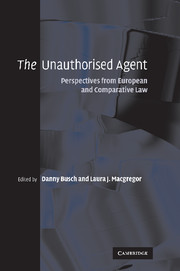Book contents
- Frontmatter
- Contents
- List of contributors
- Foreword
- Preface
- Abbreviations
- Table of cases
- 1 Introduction
- PART 1 The civilian legal systems
- PART 2 The common law
- PART 3 Mixed legal systems
- PART 4 International ‘codes’
- 11 Unauthorised agency in the Principles of European Contract Law
- 12 Unauthorised agency in the UNIDROIT Principles of International Commercial Contracts 2004
- PART 5 Conclusions
- Bibliography
- Index
11 - Unauthorised agency in the Principles of European Contract Law
Published online by Cambridge University Press: 07 September 2009
- Frontmatter
- Contents
- List of contributors
- Foreword
- Preface
- Abbreviations
- Table of cases
- 1 Introduction
- PART 1 The civilian legal systems
- PART 2 The common law
- PART 3 Mixed legal systems
- PART 4 International ‘codes’
- 11 Unauthorised agency in the Principles of European Contract Law
- 12 Unauthorised agency in the UNIDROIT Principles of International Commercial Contracts 2004
- PART 5 Conclusions
- Bibliography
- Index
Summary
Introduction
This chapter concentrates on the rules with respect to unauthorised agency provided by the Principles of European Contract Law. These principles devote an entire chapter to agency (Chapter 3: Authority of Agents). The PECL are of a non-binding nature and aim to establish rules of general contract law within the European Union.
The PECL provide the general rule that where an agent acts without (sufficient) authority, his acts do not bind the principal. This general rule is exempted in cases where the doctrine of apparent authority applies or where the principal subsequently ratifies the unauthorised act. In addition, the PECL provide that the third party may hold an unauthorised agent (the falsus procurator) liable for the damage which the third party has suffered as a consequence of the agent's lack of authority.
In this chapter, in part II, I first examine the scope of the PECL. In part III I examine the distinction made between direct and indirect agency. In part IV I devote some attention to the general effect of unauthorised agency. I then turn to the main exceptions to the general effect of unauthorised agency: apparent authority (V) and ratification (VI). Part VII follows with some remarks about the liability of the falsus procurator and part VIII with a treatment of the interrelationship between apparent authority, ratification and the liability of the falsus procurator.
- Type
- Chapter
- Information
- The Unauthorised AgentPerspectives from European and Comparative Law, pp. 341 - 361Publisher: Cambridge University PressPrint publication year: 2009



